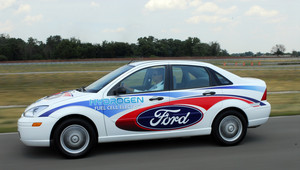|
Send this page to a friend! Fill in the form bellow | ||
news
Daimler, Renault-Nissan and Ford Will Collaborate on Fuel Cells
Sign agreement with mass market vehicle as soon as 2017
As we reported on Friday, Mercedes Mercedes-BenzGermany, 1924 > present197 models
Mercedes-BenzGermany, 1924 > present197 models
9852 photos
33 videos
is delaying its fuel cell B-Class Mercedes-Benz B F-CELLGermany, 2010 > present5 photos
Mercedes-Benz B F-CELLGermany, 2010 > present5 photos
that was originally meant to be on sale by 2015 because current fuel cell technology is too expensive. There was speculation that Daimler DaimlerGermany, 1889 > present12 models
DaimlerGermany, 1889 > present12 models
77 photos
1 video
and its technological partner Renault RenaultFrance, 1898 > present189 models
RenaultFrance, 1898 > present189 models
6052 photos
17 videos
-Nissan NissanJapan, 1932 > present159 models
NissanJapan, 1932 > present159 models
6957 photos
12 videos
would agree to work together on a cheaper hydrogen fuel cell. Now, Mercedes, Renault-Nissan and Ford FordUnited States of America, 1903 > present92 models
FordUnited States of America, 1903 > present92 models
2522 photos
11 videos
have signed an agreement that the three auto companies will co-develop a less expensive fuel cell solution that will be ready for mass production by 2017.
As part of the agreement, each company will invest equally into the agreement. The hope is that the project will lead to better economies of scale and maximize design commonality. In the end, the three automakers hope to have a common fuel cell stack and fuel cell system that can be mated to each company’s own electric motors.
Signing a shared development agreement will have the major advantage of having a shared standard for fuel cells in North America, Europe and Japan, which represent a majority of world auto sales.
Each of the companies have already built their own fuel cell electric vehicles, but the costs are still too high to bring the cars to market. The agreement hopes to find a way to make this technology cheaper by sharing knowledge and through further research.
Fuel cells have been seen as the holy grail of efficient motoring for the last decade. The technology allows a car to be fueled by hydrogen to create electricity, and the only by-product is water vapor. It also has a power density on par with gasoline.
“Fuel cell electric vehicles are the obvious next step to complement today's battery electric vehicles as our industry embraces more sustainable transportation. We look forward to a future where we can answer many customer needs by adding FCEVs on top of battery EVs within the zero-emission lineup," said Mitsuhiko Yamashita, Nissan head of research and development.
Encyclopedia |
Contribute
more about Daimler



latest news











